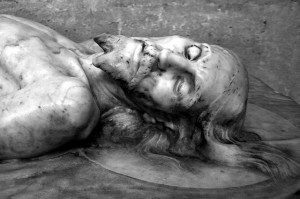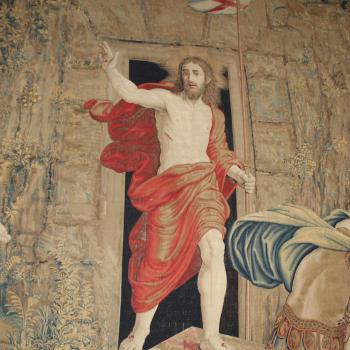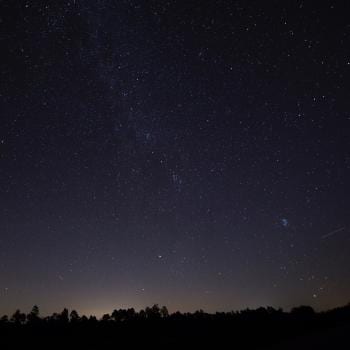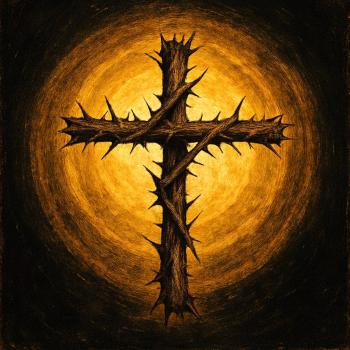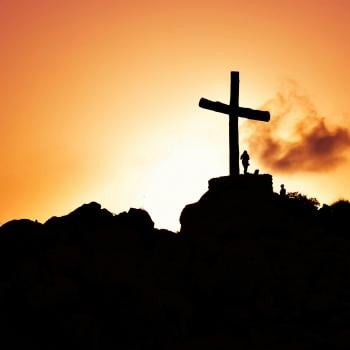Holy Saturday is a day in which nothing happens, nothing is guaranteed, and nothing hoped for. It is the day Jesus lay in the grave, framed by the anguish of Good Friday and the celebration of Easter. Holy Sunday is the day in between, a time of despair and hope for Jesus’ first followers and us.
It is clear that none of Jesus’ followers expected the resurrection. Perhaps, they imaged a divine restoration at the end of history, but not in the midst of time. Jesus was dead and they would have to wait to the revealing of God’s Realm to meet him again. Holy Saturday is the abyss: it is the experience of the apophatic, if the apophatic can be experienced, the imageless abyss of unknowing, the valley of grief no hope of healing.
Although I am optimistic theologically and personally, I find Holy Saturday a window into reality. A holistic faith requires us to recognize the dazzling darkness of liminal times. On Holy Saturday, there are no guarantees that life will get better, disease will be cured, a lost child will return home, we will regain our professional status, hope will return, or that God will become real again. We need a miracle – a resurrection – but we cannot force it, guarantee it, or assume it. Resurrection happens, like falling love or the lifting of grief, when we least expect it or believe love has passed us by. But, when it happens, we discover our cup runs over even though we still must sojourn through the valley of the shadow.
This is what it means to live in a liminal time, in the wilderness with no compass, roadmap, or pathway. The Quakers say “a way will be made,” but on Holy Saturday, there is no clear way ahead for us; we are stuck in one place or perhaps we wander in circles, lost with no expectation of finding our way.
I think it is important to recover Holy Saturday as a day of spiritual reflection. Just as many people are tempted to skip from Palm Sunday to Easter, and miss the conflict and agony of Holy Week, others omit Holy Saturday, going from the tragedy of the Cross to the celebration of resurrection without the wilderness of grief and uncertainty that lies between.
Without Holy Friday, Easter becomes superficial and predictable. Although it is difficult, we must put ourselves in the place of Jesus’ first followers. We must come to Easter without hope or, at least, agnostic about divine providence and possibility changing our lives. Holy Saturday is a testimony to hope and an invitation to persist – like the apostle Thomas – despite all of our doubts. After all, Thomas is a hero of faith: he alone of the first followers missed the resurrection. When he returned to their company, he heard wild stories of resurrection; but the living Christ did not appear to him. Agnosticism was an appropriate response; but Thomas does something amazing, he stays with Jesus’ ecstatic followers even though he could not share their joy. He lived in the abyss of agnosticism, hoping against hope for an encounter with Jesus. When Jesus appears, Thomas is transformed. He becomes the pilgrim apostle, whose faith takes him to India where he shared the good news to Hindu rishis and Buddhist monks. Perhaps, only someone who experienced the psychological and spirituality of Holy Saturday could address the complexity of India’s faith traditions.
Embracing Holy Saturday is an act of faith. In its liminality, it invites us to a faith that is both kataphatic and apophatic, celebrating both God’s nearness and distance. In liminal spirituality, we trust God with silence, uncertainty, unanswered prayer, failure, aging, and death. We trust that there is a subtle Presence at work – like the germination of seeds in dark soil – despite our inability to experience it. Holy Saturday reminds us that the journey of faith involves moments of joy and intimacy and also moments of apparent absence and silence. Resurrection is our hope, right now, even when we cannot expect it or wonder if God’s way will triumph insuring that we can respond to our own brokenness, the threat of global climate change, or the growing gap of rich and poor. In the suspense of the liminal, we hope that we will experience God again and with it, the courage to become God’s partners in healing the world.


